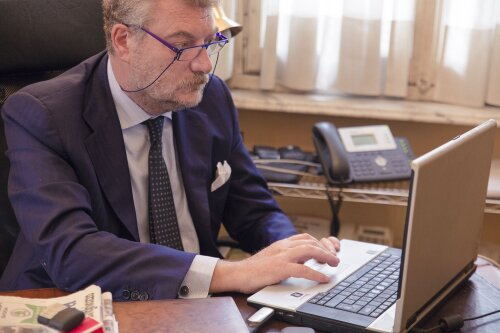Best Conveyancing Lawyers in Turin
Share your needs with us, get contacted by law firms.
Free. Takes 2 min.
Free Guide to Hiring a Real Estate Lawyer
List of the best lawyers in Turin, Italy
About Conveyancing Law in Turin, Italy
Conveyancing in Turin, Italy refers to the legal process of transferring property ownership from one party to another. This process is regulated by a set of rules and steps designed to protect both buyers and sellers and ensure that real estate transactions are conducted transparently and lawfully. In Turin, as in the rest of Italy, conveyancing is a formal process involving several professionals, such as notaries, lawyers, and real estate agents. The involvement of a notary is not only customary but legally mandatory, as the notarial deed is the only document recognized by Italian authorities to formalize property transfers.
Why You May Need a Lawyer
While some aspects of conveyancing must involve a notary, hiring a lawyer can be extremely beneficial in various situations. A lawyer can assist you in:
- Reviewing and drafting preliminary contracts (compromesso) to ensure your interests are protected
- Conducting due diligence, including checking for any encumbrances, building violations, or legal impediments affecting the property
- Negotiating contract terms between buyer and seller, especially in cases involving complex transactions or disputes
- Assisting non-Italian speakers with legal terminology and requirements unique to the Italian legal system
- Representing you in negotiations with banks, agents, or other entities involved in the transaction
- Facilitating transactions involving inheritance, gifts, or properties with unclear ownership
Whether you are buying, selling, or inheriting property in Turin, legal support can help protect your rights and minimize potential risks.
Local Laws Overview
Conveyancing in Turin is governed by both national Italian law and local regulations. Key aspects include:
- Notarial Requirement: Only a notary can execute a valid property transfer. The notary ensures all documentation is legal and registers the transaction with the local land registry.
- Preliminary Agreement: The preliminary contract (compromesso) is usually signed before the final deed. This agreement binds both parties and often involves a deposit.
- Due Diligence: Legal checks involve verifying title, property boundaries, planning permissions, mortgages, liens, or any restrictions on the property.
- Registration and Taxes: Transfers must be registered in the local land registry (Catasto and Conservatoria dei Registri Immobiliari). Buyers must also pay registration taxes and fees, including VAT if applicable.
- Buying Through a Company: Foreign nationals and companies may require additional paperwork and authorization, depending on nationality and property type.
- Property Use Restrictions: Some properties, especially older or historic properties, may have special heritage or planning restrictions imposed by local authorities in Turin.
Frequently Asked Questions
What roles do the notary and lawyer play in the conveyancing process?
The notary officially executes and registers the property transfer. A lawyer advises you, reviews contracts, conducts due diligence, and helps navigate legal complexities before the notary steps in.
How long does the conveyancing process typically take in Turin?
The process can take anywhere from one to three months, depending on the complexity of the transaction, due diligence requirements, and availability of documentation.
What costs are involved in buying a property in Turin?
Costs include the purchase price, notary fees, lawyer fees (if used), land registry fees, real estate agent commission, and applicable taxes such as registration tax, cadastral tax, and VAT where relevant.
Is it possible for foreign nationals to buy property in Turin?
Yes, foreign nationals can purchase property in Italy, although there may be restrictions for non-EU citizens depending on international agreements. Additional anti-money laundering checks may apply.
What is a preliminary contract and is it mandatory?
The preliminary contract (compromesso) outlines the terms of the sale and binds both parties to complete the transaction. While not mandatory, it is standard practice and provides legal security for both buyers and sellers.
Can I withdraw from the purchase after signing the preliminary contract?
If you withdraw after signing, you may forfeit your deposit unless you can show a valid legal reason. The seller may also face penalties if they withdraw.
What happens if the property has outstanding debts or mortgages?
Your lawyer and the notary will check for any encumbrances. Debts or mortgages should be cleared before the transaction or arrangements should be made to settle them at the time of the sale.
Are there specific requirements for buying historic or protected properties in Turin?
Yes, properties with historic or cultural value may be subject to special regulations and approval by heritage authorities. These restrictions can affect renovations or changes to the property.
Are building permits required for renovation work?
Most renovation projects require local planning permission or building permits. Unauthorized works can affect your legal title and may result in fines or legal issues.
Is it necessary to have a survey before purchasing property?
It is not legally required but highly recommended to engage a qualified surveyor to assess the structural condition and boundaries of the property.
Additional Resources
For further information and support regarding conveyancing in Turin, consider consulting the following:
- The Consiglio Nazionale del Notariato (National Council of Notaries) for information about notarial services and property transfers
- Local Branch of the Camera del Commercio di Torino for general information on buying and selling property
- Turin Bar Association (Ordine degli Avvocati di Torino) for finding qualified property lawyers
- Agenzia delle Entrate for property taxes, cadastral registry, and tax-related questions
- Municipality of Turin (Comune di Torino) Urban Planning Office for permit requirements and urban regulations
Next Steps
If you are considering buying, selling, or inheriting property in Turin, it is best to start by consulting a local lawyer with experience in conveyancing. Prepare all relevant documents, such as identification, proof of funds, and property details, before meeting your legal advisor. The lawyer can help you understand your rights, review agreements, and guide you through all steps of the process. Finally, coordinate with a notary for the formal execution and registration of the transaction to ensure compliance with Italian law.
Lawzana helps you find the best lawyers and law firms in Turin through a curated and pre-screened list of qualified legal professionals. Our platform offers rankings and detailed profiles of attorneys and law firms, allowing you to compare based on practice areas, including Conveyancing, experience, and client feedback.
Each profile includes a description of the firm's areas of practice, client reviews, team members and partners, year of establishment, spoken languages, office locations, contact information, social media presence, and any published articles or resources. Most firms on our platform speak English and are experienced in both local and international legal matters.
Get a quote from top-rated law firms in Turin, Italy — quickly, securely, and without unnecessary hassle.
Disclaimer:
The information provided on this page is for general informational purposes only and does not constitute legal advice. While we strive to ensure the accuracy and relevance of the content, legal information may change over time, and interpretations of the law can vary. You should always consult with a qualified legal professional for advice specific to your situation.
We disclaim all liability for actions taken or not taken based on the content of this page. If you believe any information is incorrect or outdated, please contact us, and we will review and update it where appropriate.









